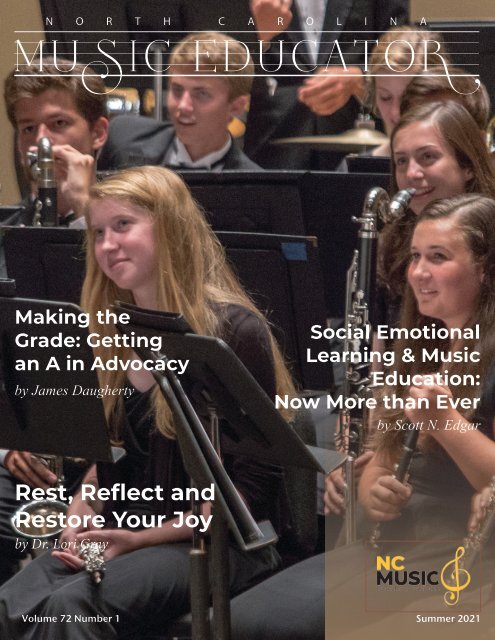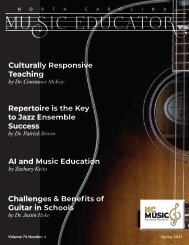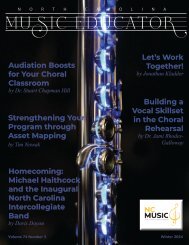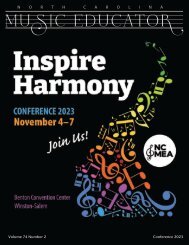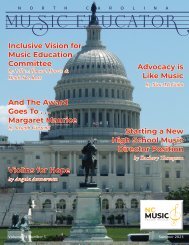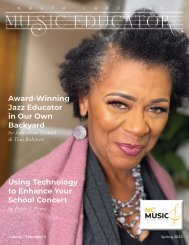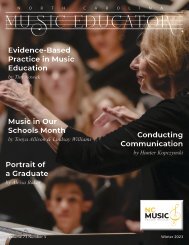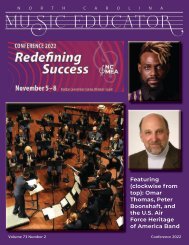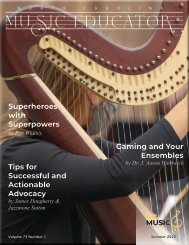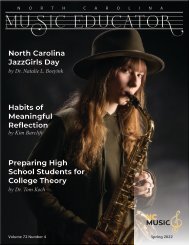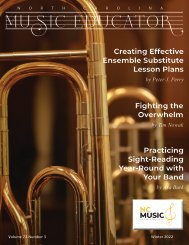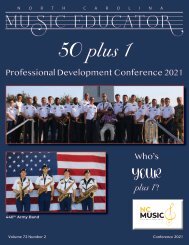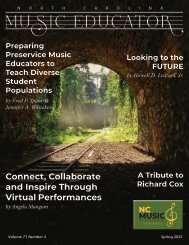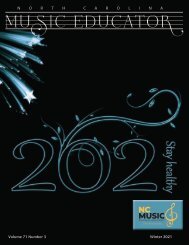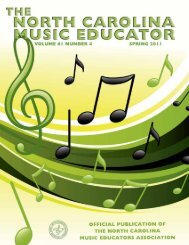North Carolina Music Educator Journal Summer 2021
Professional journal for North Carolina music educators, Summer 2021
Professional journal for North Carolina music educators, Summer 2021
You also want an ePaper? Increase the reach of your titles
YUMPU automatically turns print PDFs into web optimized ePapers that Google loves.
N O R T H C A R O L I N A<br />
MUSIC EDUCATOR<br />
Making the<br />
Grade: Getting<br />
an A in Advocacy<br />
by James Daugherty<br />
Social Emotional<br />
Learning & <strong>Music</strong><br />
Education:<br />
Now More than Ever<br />
by Scott N. Edgar<br />
Rest, Reflect and<br />
Restore Your Joy<br />
by Dr. Lori Gray<br />
Volume 72 Number 1 <strong>Summer</strong> <strong>2021</strong><br />
NORTH CAROLINA MUSIC EDUCATOR | 1
MARRIOTT WINSTON-SALEM<br />
REIMAGINED<br />
Business becomes pleasure at the newly reimagined<br />
Marriott Winston-Salem featuring:<br />
3 Guest rooms and suites each with Plush Serta ® Perfect Sleeper ® Mattresses,<br />
work desk with ergonomic chair, 55” mounted HDTV, mini-refrigerator, coffee<br />
maker, hair dryer, iron/ironing board, walk-in tiled showers (majority of rooms),<br />
two-line phone with voicemail, complimentary high-speed wireless Internet<br />
3 Butcher & Bull Restaurant & Lounge<br />
3 2,500 sq. ft. state-of-the-art fitness center with 24-hour key card access<br />
3 Conveniently located in the heart of downtown<br />
To plan your next meeting or group event, please email: info@twincityquarter.com<br />
EVEN TEACHERS<br />
NEED TEACHERS<br />
The Yamaha <strong>Educator</strong> Suite (YES) gives you access to a wealth of professional development<br />
opportunities and resources. YES brings you into a network of like-minded colleagues,<br />
experts and professionals who want to share their real-world experiences. You’ll also receive<br />
valuable tips on advocacy assistance, program health support and much more. Let us help you<br />
raise the bar. Go to Yamaha.io/educatorsNCME2<br />
425 <strong>North</strong> Cherry Street<br />
Winston-Salem, NC 27101<br />
336-725-3500<br />
info@twincityquarter.com<br />
2 | NORTH CAROLINA MUSIC EDUCATOR NORTH CAROLINA MUSIC EDUCATOR | 1
N O R T H C A R O L I N A<br />
MUSIC EDUCATOR<br />
Making music for today and a lifetime.<br />
UNC WILMINGTON<br />
NCMEA Board Directory<br />
NCMEA Executive Director’s Message<br />
Pat Hall<br />
NCMEA President’s Message<br />
Carol Earnhardt<br />
4<br />
6<br />
8<br />
A special thank you to all our advertisers who<br />
support music educators and music education in<br />
<strong>North</strong> <strong>Carolina</strong>.<br />
Brevard College<br />
28<br />
UNDERGRADUATE STUDY<br />
BACHELOR OF MUSIC<br />
IN MUSIC EDUCATION<br />
DEPARTMENT OF MUSIC<br />
Check online<br />
for our <strong>2021</strong>-22<br />
audition dates:<br />
www.uncw.edu/music<br />
Thanks, Pat!<br />
Band Section<br />
Young Professionals Symposium<br />
Making the Grade: Getting an A in Advocacy<br />
James Daugherty<br />
Elementary Choral Section<br />
Rest, Reflect and Restore Your Joy<br />
Dr. Lori Gray<br />
Middle School Choral Section<br />
Social Emotional Learning & <strong>Music</strong> Education:<br />
Now More than Ever<br />
Scott N. Edgar<br />
10<br />
12<br />
13<br />
14<br />
18<br />
20<br />
22<br />
24<br />
East <strong>Carolina</strong> University<br />
Eastern <strong>Music</strong> Festival<br />
Hayes School of <strong>Music</strong><br />
Marriott Winston-Salem<br />
Mars Hill University<br />
Meredith College<br />
NAfME<br />
UNC Charlotte<br />
UNC Greensboro<br />
UNC Pembroke<br />
UNC Wilmington<br />
Yamaha<br />
23<br />
7<br />
13<br />
1<br />
11<br />
25<br />
19, Back Cover<br />
15<br />
21<br />
17<br />
3, 27<br />
Inside Front Cover<br />
BACHELOR OF ARTS<br />
IN MUSIC<br />
• PERFORMANCE:<br />
instrumental<br />
piano<br />
vocal<br />
• GENERAL MUSIC<br />
• JAZZ STUDIES<br />
• MUSIC TECHNOLOGY<br />
• MINORS<br />
choral music<br />
general music<br />
jazz studies<br />
Higher Education Section<br />
29<br />
Editorial: All editorial content should be sent to: Kimberly<br />
Justen, Editor-in-Chief, at journal_editor@ncmea.net.<br />
Advertising: Information requests and ad orders should<br />
be directed to Kimberly Justen, Editor-in-Chief, at<br />
journal_editor@ncmea.net.<br />
Changed Schools? New Email Address?<br />
New Mailing Address?<br />
Stay in touch with NCMEA/NAfME<br />
Log in to the NAfME Member Portal and make<br />
your updates.<br />
www.nafme.org LOGIN then MEMBER PORTAL<br />
If you need assistance call NAfME Member<br />
Services 800-336-3768<br />
<strong>North</strong> <strong>Carolina</strong> <strong>Music</strong> <strong>Educator</strong> is copyrighted. Reproduction<br />
in any form is illegal without the express permission of the<br />
editor.<br />
Postmaster: Send address changes to: NC <strong>Music</strong> <strong>Educator</strong>, c/o<br />
NCMEA, 883-C Washington Street, Raleigh, NC 27605.<br />
Non-Profit 501(c)(3) Organization U.S. Postage Paid at Lubbock,<br />
Texas. ISSN Number 0400-3332 EIN number<br />
20-3325550<br />
uncw.edu/music<br />
for more information:<br />
910.962.3415<br />
uncwmus@uncw.edu<br />
UNCW is an EEO/AA Institution.<br />
Accommodations for disabilities may be requested by contacting the Disabilities Resource Center<br />
at 910.962.7555 at least seven days prior to the event.<br />
2 | NORTH CAROLINA MUSIC EDUCATOR Questions regarding UNCW’s Title IX compliance NORTH should CAROLINA be directed MUSIC to titleix@uncw.edu.<br />
EDUCATOR | 3
Board of Directors<br />
EXECUTIVE OFFICERS<br />
SECTION CHAIRS<br />
COMMISSION & COMMITTEE CHAIRS<br />
President: Carol Earnhardt*<br />
Forsyth County<br />
cearnhardt@ncmea.net<br />
Immediate Past President: Open<br />
President-Elect: Johnathan Hamiel*<br />
Forsyth County<br />
jhamiel@ncmea.net<br />
Recording Secretary:<br />
Ruth Petersen*<br />
Mecklenburg County<br />
secretary@ncmea.net<br />
Member-at-Large:<br />
Lillie Allmond Harris*<br />
Guilford County<br />
member-at-large1@ncmea.net<br />
Member-at-Large: Quincy Lundy*<br />
Forsyth County<br />
member-at-large2@ncmea.net<br />
Band: Jamie Bream*<br />
Scotland County<br />
band_chair@ncmea.net<br />
Band Section Delegate:<br />
Drew Carter*<br />
band_delegate@ncmea.net<br />
Collegiate NAfME: Molly Allman*<br />
Watauga County<br />
collegiate_president@ncmea.net<br />
Elementary: Dawn Wilson*<br />
Beaufort County<br />
elementary_section@ncmea.net<br />
High School Choral:<br />
Roman Brady*<br />
Forsyth County<br />
hschoral_chair@ncmea.net<br />
Higher Education:<br />
Jennifer Whitaker*<br />
Mecklenburg County<br />
higher_education@ncmea.net<br />
Jazz Education: Kevin Young*<br />
Buncombe County<br />
jazz_chair@ncmea.net<br />
Jazz Section Delegate:<br />
Ana Bulluck*<br />
Haywood County<br />
jazz_delegate@ncmea.net<br />
Middle School Choral:<br />
Carla Reid*<br />
Caldwell County<br />
mschoral_chair@ncmea.net<br />
Orchestra: Ryan Ellefsen*<br />
Orange County<br />
orchestra_chair@ncmea.net<br />
Orchestra Section Delegate:<br />
Corrie Franklin*<br />
Orange County<br />
orchestra_delegate@ncmea.net<br />
Exceptional Children & General<br />
<strong>Music</strong>: Rue S. Lee-Holmes<br />
Sampson County<br />
exeptionalchildren_generalmusic@ncmea.net<br />
Conference Chair: Barbara Geer<br />
Forsyth County<br />
conference_chair@ncmea.net<br />
Asst. Conference Chair: Adam Joiner<br />
Forsyth County<br />
conference_assistant@ncmea.net<br />
Mentoring: Windy Fullagar<br />
Mecklenburg County<br />
mentoring_program@ncmea.net<br />
IVfME: Johnathan Hamiel<br />
Forsyth County<br />
jhamiel@ncmea.net<br />
AWARDS, GRANTS<br />
& SCHOLARSHIP CHAIRS<br />
<strong>Music</strong> In Our Schools Month:<br />
Angela Mangum<br />
Granville County<br />
miosm_chair@ncmea.net<br />
<strong>Music</strong> Program Leaders:<br />
Andrew Craft<br />
Forsyth County<br />
music_program_leader@ncmea.net<br />
Research: Tim Nowak<br />
Pitt County<br />
research_chair@ncmea.net<br />
Retired Membership: Libby Brown<br />
Watauga County<br />
retired_membership@ncmea.net<br />
Student Activities:<br />
Johnathan Hamiel<br />
Forsyth County<br />
jhamiel@ncmea.net<br />
STANDING COMMITTEE CHAIRS<br />
Teacher Education: Jose Rivera<br />
Robeson County<br />
teacher_education@ncmea.net<br />
Technology Chair:<br />
Howell “Howie” Ledford<br />
Guilford County<br />
technology_chair@ncmea.net<br />
Tri-M: Open<br />
tri-m@ncmea.net<br />
Webmaster: Mark Healy<br />
Wake County<br />
mhealy@ncmea.net<br />
Young Professionals: Lisa Qualls<br />
Randolph County<br />
young_professionals@ncmea.net<br />
EX-OFFICIO MEMBERS<br />
DISTRICT PRESIDENTS<br />
Awards: Lillie Allmond Harris<br />
Guilford County<br />
member-at-large1@ncmea.net<br />
Mini Grant: open<br />
<strong>Summer</strong> Professional<br />
Development Grant: Jose Rivera<br />
Robeson County<br />
teacher_education@ncmea.net<br />
Scholarships: Quincy Lundy<br />
Mecklenburg County<br />
member-at-large2@ncmea.net<br />
Advocacy: James Daugherty<br />
Davidson County<br />
jdaugherty@ncmea.net<br />
Constitution: Maribeth Yoder-White<br />
Watauga County<br />
constitution_committee@ncmea.net<br />
Finance: Dave Albert<br />
Wake County<br />
parlimentarian@ncmea.net<br />
Membership: Johnathan Hamiel<br />
Forsyth County<br />
jhamiel@ncmea.net<br />
Publications: Kim Justen<br />
journal_editor@ncmea.net<br />
Collegiate NAfME Advisor:<br />
Lisa Runner<br />
Randolph County<br />
collegiate_advisor@ncmea.net<br />
Editor: Kim Justen<br />
journal_editor@ncmea.net<br />
Executive Director: Pat Hall<br />
Wake County<br />
pathall@ncmea.net<br />
Historian: Dr. John Henry, Jr.<br />
Guilford County<br />
historian@ncmea.net<br />
District 1: Dawn Rockwell*<br />
Beaufort County<br />
district1@ncmea.net<br />
District 2: Jeffrey Danielson*<br />
Carteret County<br />
district2@ncmea.net<br />
District 3: Tonya Suggs*<br />
Wake County<br />
district3@ncmea.net<br />
District 4: Tyler Harper*<br />
Robeson County<br />
district4@ncmea.net<br />
District 5: Tonya Allison*<br />
Forsyth County<br />
district5@ncmea.net<br />
District 6: Alice Pounders*<br />
Lincoln County<br />
district6@ncmea.net<br />
District 7: Janet Berry*<br />
Burke County<br />
district7@ncmea.net<br />
District 8: James Phillips*<br />
Henderson County<br />
district8@ncmea.net<br />
* Voting Member<br />
Counties listed reflect the county taught in<br />
883-C Washington Street<br />
Raleigh, NC 27605<br />
919-424-7008<br />
www.ncmea.net<br />
Executive Director: Pat Hall<br />
pathall@ncmea.net<br />
NCMEA OFFICE<br />
Communications Manager:<br />
Mark Healy<br />
Wake County<br />
mhealy@ncmea.net<br />
<strong>Music</strong> Industry Rep.: Adam Frank<br />
Mecklenburg County<br />
music_industry_rep@ncmea.net<br />
Parlimentarian: Dave Albert<br />
Wake County<br />
parlimentarian@ncmea.net<br />
NCDPI Rep.: Brandon Roeder<br />
Granville County<br />
brandon.roeder@dpi.nc.gov<br />
advancing music education by promoting<br />
the understanding and making of music by all<br />
4 | NORTH CAROLINA MUSIC EDUCATOR NORTH CAROLINA MUSIC EDUCATOR | 5
Notes from the Executive Director<br />
Looking Back<br />
In June 2013, the week before my official start date as NCMEA<br />
executive director, I attended my first NAfME National<br />
Assembly in Washington, D.C. It was an incredible first music<br />
education experience. I felt very welcome by the national music<br />
education leadership community. I formed great friendships and<br />
leaned on my fellow executive directors for advice and direction<br />
as I grew into my position. I do recall when I got back from the<br />
meeting, someone asked then President Sonja Williams how I did.<br />
The response was, “she took a lot of notes.”<br />
My first year as executive director, I followed what I had<br />
learned from my predecessor, Reta Phifer, about NCMEA finances,<br />
student-event finances and reporting, conference planning, board<br />
meeting planning and even how<br />
to ship MPA plaques. Being<br />
a non-music educator, the<br />
nomenclature was way outside<br />
my box. I was not sure what an<br />
MPA was. I had to figure out<br />
the difference between EDBA<br />
and SCDBA, Orchestra East and<br />
West, HS Choral East 1 LE and<br />
MS Choral West 2 SSE, or was it<br />
SEMPA? What is the difference<br />
between Honors and All-State<br />
Ensembles? Oh, one is audition<br />
and the other allotment. But<br />
only in <strong>North</strong> <strong>Carolina</strong>. It<br />
seemed in every other state in the country, All-State was the BIG<br />
audition Festival. Is MPA still a festival? I survived year one.<br />
My undertaking year two was to consolidate the vast amount<br />
of paperwork created by board communication, conference, and<br />
financial reporting. I was introduced to Google Apps by board<br />
member and technology whiz, Barb Vinal. We transitioned all<br />
board members to ncmea.net email addresses. We began using the<br />
Google drive for all NCMEA communications and board meeting<br />
reports. And we still do today!<br />
I was finally getting my head around the Sections/Districts/<br />
Events and the acronyms that go along with them. The financial<br />
reporting requirements for the more than 60 student events<br />
NCMEA holds around the state were a little overwhelming when<br />
huge envelopes of paper reports hit my desk. Did I mention, we<br />
also had 60 different bank accounts for each event and as many<br />
bank statements?<br />
Pat Hall<br />
I saw an opportunity to make student event reporting easier for<br />
the event chairs and easier for me. We consolidated all the banks<br />
accounts to one bank, eliminating the need to print and mail all<br />
those statements. At about the same time, we created a new excel<br />
financial reporting form. I want to thank John Lowe for helping<br />
create the new financial reporting form with all those macros that<br />
made everyone’s reporting tasks much easier.<br />
I also thank all the Section and Student Event chairs who<br />
worked diligently with me as we consolidated the bank accounts to<br />
one bank. (You know who you are!)<br />
Conference! The first conference under my watch was<br />
2013. Again, I followed the incredibly detailed plans left by<br />
my predecessor. I hired a<br />
temporary conference assistant<br />
to help with registration.<br />
I worked with a printing<br />
company to produce 2,000<br />
program books. I ordered<br />
on-site registration forms,<br />
membership forms, name<br />
badges, badge holders,<br />
lanyards, certificates, plaques,<br />
and oh, the ribbons. You know,<br />
the colored ribbons you stick<br />
to your name badge. There<br />
must have been more than 30<br />
types of ribbons to order. That<br />
year, per Reta’s advice, we hired a van and a driver to get everything<br />
to Winston-Salem from Raleigh.<br />
In the following years, we had the ability to do online<br />
registration with the help of the NAfME IT Staff. We introduced<br />
the conference mobile app! By streamlining these procedures, we<br />
were able to save on all that printing. We still ordered many, many<br />
ribbons. But, we were able to get all the Conference materials into<br />
two cars and happily drive to Winston-Salem.<br />
I want to thank conference chair Barbara Geer, and conference<br />
co-chairs Libby Brown and Adam Joiner, without whom<br />
conference would not be as efficiently planned and seamless for<br />
our attendees. I learned a lot from you guys! And we had a bunch<br />
of fun!<br />
Each year, I learned something new, and we tweaked our<br />
procedures to keep NCMEA moving forward.<br />
Through incredible board leadership, NCMEA was recognized<br />
twice on the national level. In 2015, NCMEA was presented the<br />
Excellence in Membership Award in recognition of impressive<br />
membership growth, the result of superior leadership and<br />
volunteer coordination during the NCMEA/NAfME Recruitment<br />
Campaign. This campaign was led by Richard Holmes and James<br />
Daugherty.<br />
In 2017, NCMEA was presented NAfME’s Excellence in<br />
Advocacy Award. Under James Daugherty’s leadership, NCMEA<br />
worked hard to influence the state’s ESSA plan. We also became<br />
engaged in advocating against a provision in the state budget that<br />
would cause local school districts to lose the flexibility they had<br />
used for many years to fund elementary music, art, PE, and world<br />
language teachers because of a mandated class size reduction in<br />
grades K – 3.<br />
Also in summer 2017, NCMEA made one huge step in<br />
increasing our advocacy efforts by entering into an agreement to<br />
hire a lobbyist. To this day, Ashley Perkinson and her colleague,<br />
Rachel Beaulieu, have guided NCMEA in identifying legislative<br />
priorities; actively lobby legislators on behalf of the Association;<br />
monitoring bills of interest to the Association; and actively<br />
lobbying against bills of interest or budget provisions that would<br />
negatively impact music educators.<br />
One other small project that I am incredibly pleased that was<br />
approved by the NCMEA Board was the creation of a new logo for<br />
the association. NCMEA’s 50 th anniversary in 2020 was the catalyst.<br />
NCMEA communications manager/webmaster, Mark Healy, and<br />
I worked with our printer’s graphics team to create the new logo<br />
for the 50 th anniversary, as well as one we could use in future years.<br />
The new NCMEA logo incorporates a gold color that complements<br />
NAfME’s logo so we can co-brand music education programs<br />
and initiatives at the state and national level. We also wanted to<br />
promote each NCMEA Section as a co-brand of NCMEA. In this<br />
<strong>Journal</strong>, you’ll see the new color logos for Band, Choral, Jazz,<br />
Elementary, Higher Education and Collegiate NCMEA Sections.<br />
Looking back, some of my favorite memories will be the July<br />
Leadership meetings; all the board meetings; traveling around<br />
the state attending concerts and section meetings; of course,<br />
conference planning and attending NAfME Leadership Assembly<br />
and Southern Division meetings.<br />
I want to share my gratitude to the 2012 – 2013 board<br />
for having the faith in me, a non-music educator, to lead this<br />
organization. I knew when I accepted this position it would be my<br />
“end of career” job. It has been my best job! I have never known a<br />
group of human beings more passionate and dedicated than music<br />
educators. I cherish the professional relationships and friendships<br />
I have made with the leaders in this association. It has filled me<br />
with an incredible sense of belonging. I will continue to support<br />
NCMEA and music education any way I can in the years to come.<br />
And finally, I want to thank the current NCMEA Leadership,<br />
Carol Earnhardt, Johnathan Hamiel and Jazzmone Sutton, for<br />
leading the search for my successor. They didn’t want to do this.<br />
You can fully trust their leadership and the input from the entire<br />
executive search committee in naming my successor! I know you<br />
will all welcome Susan Heiserman and love her and support her as<br />
you did with me!<br />
Celebrating<br />
60 Years<br />
of <strong>Music</strong>al<br />
Excellence<br />
June 26-July 31, <strong>2021</strong><br />
Greensboro, <strong>North</strong> <strong>Carolina</strong><br />
Tickets on sale NOW! Seating is limited!<br />
Visit easternmusicfestival.org/calendar<br />
for program and performer details.<br />
6 | NORTH CAROLINA MUSIC EDUCATOR NORTH CAROLINA MUSIC EDUCATOR | 7
President’s Message<br />
I<br />
love beginnings. I’m writing this article on the first day of<br />
summer. School is over for the year and weeks of long, restful<br />
summer days lie ahead. The NAfME National Assembly is this<br />
week, an event that has started my summer for the past four years.<br />
National Assembly is a meeting of leaders of MEA’s from across<br />
the country. I learn so much and am amazed at the scope of our<br />
organization through a national lens.<br />
NCMEA has many new beginnings this year. The board met<br />
this past spring – our first in-person meeting since January<br />
2020. We covered many topics of concern, including a vote to<br />
hold the <strong>2021</strong> conference in person at the Benton Convention<br />
Center November 6 – 9. The virtual conference went well in 2020,<br />
but the experience was nothing compared to our live annual<br />
gathering in Winston-Salem. Since then, conference planners<br />
and section chairs have met multiple times to discuss the effect<br />
of the changing face of COVID, especially concerning student<br />
ensembles. We will continue to monitor CDC and NCDHHS<br />
guidelines over the summer, and should have a solid plan for you<br />
by the start of the school year. Please support – and be patient<br />
with – our ensemble coordinators, as they are working diligently<br />
to make sure students have this opportunity while remaining safe<br />
during rehearsals.<br />
Retirement<br />
A new and exciting beginning for Pat Hall is a very sad ending<br />
for us all. Pat is retiring. Retirement is a milestone we all look<br />
forward to. It’s a beginning that is probably the most exciting of<br />
our entire life. Pat will have the freedom to focus on her family<br />
and to explore many trails on her bicycle.<br />
As we all know, Pat has been a longtime advocate for the arts,<br />
not just in her work with NCMEA. She told me she doesn’t plan<br />
to stop working, but will use some of her newfound freedom to<br />
continue supporting and advocating for the arts. She has been a<br />
genuine treasure for our organization. It has been her leadership<br />
in the past eight<br />
years that made<br />
NCMEA financially<br />
and organizationally<br />
strong enough<br />
to withstand the<br />
pandemic. She has<br />
been a model for<br />
executive directors<br />
of other MEA’s<br />
throughout the<br />
country. But most<br />
Carol Earnhardt<br />
of all, she has been a friend to us all. We will all miss her so<br />
much. Pat, we wish you the best of luck as you step into this new<br />
beginning!<br />
Pat will continue in our organization on a contract basis to<br />
help with the new executive director transition. So, you may<br />
hear her voice when you call the NCMEA office. And, you will<br />
definitely see her at the November conference.<br />
Welcome Our New ED<br />
Every member of the NCMEA<br />
board felt that filling the position<br />
of executive director would require<br />
an incredible amount of work.<br />
We had some big shoes to fill!<br />
Consequently, the board voted to<br />
hire the firm Armstrong McGuire<br />
to help us with the search. The<br />
transition committee met with<br />
Katie Weeks, from Armstrong<br />
McGuire, on multiple occasions to<br />
discuss the strengths and weaknesses of NCMEA, to brainstorm<br />
the qualities and attributes of the person we would hire as our next<br />
executive director, and to review the results of a member survey.<br />
Throughout March and April, she met with many groups:<br />
NCMEA members, event coordinators, executive directors<br />
from other MEA’s, conference stakeholders and event staff, our<br />
lobbyists, Pat, and more. The information gathered from these<br />
discussions and meetings was used to create a position profile that<br />
was advertised through multiple email lists, websites, and listservs.<br />
The committee spent many hours interviewing candidates and<br />
debating our selection. At a recent board meeting, our nomination<br />
was approved and we are proud to announce Susan Heiserman<br />
will serve as our next executive director.<br />
Heiserman comes to us with many years of experience as<br />
an executive director of a professional artistic organization.<br />
Her responsibilities for that organization included program<br />
management, membership development and communications,<br />
financial oversight and reporting, strategic planning, and<br />
organizing a yearly conference for 500+ attendees. She managed<br />
the budget of the organization and implemented an annual<br />
sponsorship program that increased their revenue by 20%. In<br />
addition to her many great attributes as an executive director,<br />
she holds a Doctorate of <strong>Music</strong>al Arts in collaborative piano<br />
and coaching from the University of Minnesota in Minneapolis.<br />
She has served as an accompanist and vocal coach in Chicago,<br />
working with the Chicago Youth Symphony Orchestra, the<br />
Midwest Young Artists, and the Botti Opera Showcase. Also in<br />
Chicago, she served as the artistic and managing director of the<br />
PianoForte Foundation.<br />
Heiserman is a long-standing advocate for the arts and<br />
has attended Arts NC Arts Advocacy Day in Raleigh on many<br />
occasions to meet with legislators concerning the importance of<br />
the arts to <strong>North</strong> <strong>Carolina</strong> residents. A product of public schools<br />
who benefited from a quality music education, she is excited<br />
for the “opportunity to join an organization that promotes an<br />
understanding and making of music by all.” She and her family<br />
reside in Cary. Please help me in welcoming Susan to her new<br />
beginning with NCMEA!<br />
I would like to thank the transition committee for their tireless<br />
work in this process. Each of these members truly love our<br />
organization and worked hard to ensure we hired a candidate who<br />
would further our mission and vision and provide our members<br />
a confident source of the abilities needed to ensure the stability of<br />
NCMEA:<br />
Lillie Allmond Harris<br />
Jamie Bream<br />
Meghan Chinn<br />
James Daugherty<br />
Carol Earnhardt, chair<br />
Johnathan Hamiel<br />
Ruth Petersen<br />
Jose Rivera<br />
Jazzmone Sutton<br />
Professional Development Conference<br />
Scholarship<br />
Do you know anyone who has never attended our Professional<br />
Development Conference? Help us give them a new beginning<br />
that will change their professional lives! The Professional<br />
Development Conference Scholarship is intended to provide grant<br />
funding to NCMEA members attending the NCMEA Professional<br />
Development Conference for the first time. Three scholarships will<br />
be awarded each year. The scholarship funds will cover the cost of<br />
conference registration and three nights in the conference hotel.<br />
The deadline to apply for the scholarship is September 15, <strong>2021</strong>.<br />
Please encourage music teachers in your area to start the journey<br />
today.<br />
The 2020 – <strong>2021</strong> school year was arguably the toughest year<br />
I’ve experienced in my career. I am sure you feel the same. We all<br />
need this summer to reset so we can face new challenges in the<br />
next school year. Most likely, you are reading this article near the<br />
beginning of the school year. Over the summer, I hope you’ve<br />
had time to slow down, reflect, and dream about the possibilities<br />
the <strong>2021</strong> – 2022 school year holds. Enjoy this new beginning and<br />
know your students need you more now than ever. I encourage<br />
you to search for ways to reconnect your students to you, your<br />
program, and most of all, to their love of music.<br />
Here’s to new beginnings!<br />
LIVE & IN PERSON<br />
NCMEA<br />
Professional<br />
Development<br />
Conference<br />
November 6 – 9<br />
Winston-Salem<br />
200+ clinics<br />
100 music industry<br />
representatives in Exhibitor<br />
Expo<br />
Networking with colleagues<br />
CEU Credit<br />
Online registration opens August 16<br />
8 | NORTH CAROLINA MUSIC EDUCATOR NORTH CAROLINA MUSIC EDUCATOR | 9
Thanks, Pat, for all you’ve done for us!<br />
Mars Hill University<br />
Department of <strong>Music</strong><br />
Welcomes Dr. Hunter Kopczynski<br />
New Director of Bands<br />
hunter_kopczynski@mhu.edu<br />
Mars Hill<br />
University<br />
Department of <strong>Music</strong><br />
offers the following degrees:<br />
Background photo by Rayyu Maldives photographer<br />
Bachelor of Arts in <strong>Music</strong><br />
Bachelor of <strong>Music</strong> in<br />
<strong>Music</strong> Education<br />
Bachelor of <strong>Music</strong> in<br />
Performance<br />
Significant scholarship<br />
opportunities are available!<br />
www.mhu.edu/music<br />
10 | NORTH CAROLINA MUSIC EDUCATOR NORTH CAROLINA MUSIC EDUCATOR | 11
Posters.qxp_Color Wheel Poster copy 8/17/18 3:39 PM Page 1<br />
Band<br />
Jamie Bream, Chair<br />
Young Professionals<br />
Symposium <strong>2021</strong><br />
Posters.qxp_Color Wheel Poster copy 8/17/18 3:39 PM Page 1<br />
MUSIC EDUCATION MUSIC INDUSTRY STUDIES MUSIC PERFORMANCE<br />
Program for high school juniors & seniors<br />
It’s Time...<br />
to Make <strong>Music</strong>!<br />
by Dr. Timothy Altman<br />
Welcome back! We are all looking forward to making<br />
more live music with more students and an audience.<br />
We are looking forward to more normalcy. I<br />
jokingly put normalcy because I’m a bit sick of that word (like<br />
unprecedented, new normal… insert vomit emoji). I do want to get<br />
back to making more music, and I know you do, too.<br />
To get there, first, we plan. I know you have been planning<br />
for months and our planning never stops (student leadership,<br />
performances, travel, personnel, fund raising, etc.). Keep looking<br />
forward! Take advantage of some things that don’t cost much<br />
money. The military groups don’t cost any money (but you<br />
often need to book them way in advance… so do it… long term<br />
planning). Their chamber groups are very effective because you<br />
can have them in the middle of the class (perform and then sit in<br />
sections). Some of us university folks have chamber groups that<br />
are easier to get out into schools, too (student groups and faculty<br />
groups). We may not think about coming to your school unless you<br />
ask (communicate).<br />
Literature – the right music – is so important. We find great<br />
pieces for our groups by listening. Go to NCMEA, go to Midwest,<br />
and go to other places where you will hear a lot of great band<br />
literature. Of course, so many websites have scores and recordings.<br />
It won’t all be right for your groups, but it is exciting to find some<br />
that is perfect. Make sure you don’t just like that piece because it<br />
sounds cool. That’s not a reason to program it. What can you teach<br />
with that piece? Remember your audience. Involve them in the<br />
concert (clapping, singing, whistling, etc.). Challenge your best<br />
students with some chamber music.<br />
Communication. We know we must communicate with a bunch<br />
of different people (students, parents, administrators, and beyond).<br />
But the communication between band directors is also important.<br />
We want instrumental music in <strong>North</strong> <strong>Carolina</strong> to be the best it<br />
can be. It doesn’t get that way by all of us being alone on our own<br />
little island. Tell the Band leadership in the state what you want<br />
to know more about (none of us will ever know it all… we know<br />
that). Communicate what things you need. Have you seen a great<br />
presentation at another conference and want to have that here? Tell<br />
your leadership. You have some great leadership who want to hear<br />
from you. Share what you know and what you want to know.<br />
Goals. What do your students want? What do they need? They<br />
want what you want: to feel like you are part of a team (part of<br />
a family). Research has shown we all need connections to feel<br />
success. Yes, we want musical excellence, too. That can done by<br />
making students feel like an important part of the team. We know<br />
some of them might not be at school if it weren’t for your class.<br />
Show your students your own excitement about music (and their<br />
improvement… even if it is just a little bit of improvement).<br />
“It is not about the destination. It is about the journey.” I know<br />
you have heard that. It’s true. Sometimes it is hard to see the<br />
improvement when we hear them every day. Learn to celebrate the<br />
small victories. Tell them how proud you are of their hard work<br />
(consistent practice). You know hard work is one of the many,<br />
many things we are teaching them that they will use their entire<br />
life.<br />
We are so fortunate this is our “work/job.” Have fun doing it!<br />
Dr. Timothy M. Altman is director of bands and a professor of<br />
music, teaching conducting and trumpet, at UNC Pembroke. He taught<br />
instrumental and general music at the elementary, middle school, high<br />
school, and university level in Virginia, Wisconsin, Kentucky, and <strong>North</strong><br />
<strong>Carolina</strong>.<br />
Altman was a Fulbright U.S. Scholar in Malta during spring 2019.<br />
He completed his Doctor of <strong>Music</strong>al Arts in trumpet performance<br />
at the University of Kentucky. He also has <strong>Music</strong> Education degrees<br />
from Virginia Tech (BA) and the University of Wisconsin-Whitewater<br />
(MME). His latest CD “Baroque <strong>Music</strong> for Two Trumpets, Strings, and<br />
Harpsichord” is available on iTunes, Amazon, CDBaby, and YouTube.<br />
For: <strong>North</strong> <strong>Carolina</strong> high school juniors and seniors<br />
interested in music as a profession. A maximum of 25<br />
students will be chosen from applications submitted.<br />
Purpose: These two days of sessions are specifically<br />
designed for them. Students will have opportunities to<br />
discuss and reflect on all aspects of music education as a<br />
career with college music education majors and professional<br />
educators.<br />
Posters.qxp_Color Wheel Poster copy 8/17/18 3:39 PM Page 1<br />
MUSIC EDUCATION MUSIC INDUSTRY STUDIES MUSIC PERFORMANCE<br />
Posters.qxp_Color Wheel Poster copy 8/17/18 3:39 PM Page 1<br />
MUSIC THERAPY SACRED MUSIC THEORY & COMPOSITION<br />
MUSIC EDUCATION<br />
music.appstate.edu | 828.262.3020<br />
MUSIC INDUSTRY STUDIES<br />
MUSIC THERAPY SACRED MUSIC THEORY & COMPOSITION<br />
MUSIC EDUCATION MUSIC INDUSTRY STUDIES MUSIC PERFORMANCE music.appstate.edu | 828.262.3020 MUSIC THERAPY<br />
music.appstate.edu | 828.262.3020<br />
12 | NORTH CAROLINA MUSIC EDUCATOR NORTH CAROLINA MUSIC EDUCATOR | 13<br />
MUSIC EDUCATION<br />
When: November 8 – 9 during the <strong>2021</strong> NCMEA<br />
MUSIC EDUCATION MUSIC INDUSTRY STUDIES MUSIC PERFORMANCE<br />
Conference<br />
Cost: $35 (includes one meal)<br />
Application Criteria (online application opens<br />
August 16, <strong>2021</strong>):<br />
1. Create a satisfactory resume of their musical activities.<br />
2. Complete an essay titled “My <strong>Music</strong>al Aspirations,”<br />
3. Receive an outstanding recommendation from their<br />
school music director.<br />
4. Meet the application deadline.<br />
Application Deadline: Thursday, September 30<br />
For more information and the online application form visit:<br />
https://www.ncmea.net/ncmea-conference/youngprofessionals-symposium/<br />
Questions? Email Lisa Qualls. young_professionals@ncmea.net<br />
MUSIC THERAPY SACRED MUSIC THEORY & COMPOSITION<br />
Posters.qxp_Color Wheel Poster copy 8/17/18 3:39 PM Page 1<br />
music.appstate.edu<br />
828.262.3020<br />
M<br />
music.a
y James Daugherty<br />
Making the Grade:<br />
Getting an A for<br />
Advocacy<br />
Photo by Kimberly Farmer on Unsplash<br />
<strong>Music</strong> transforms people and communities.<br />
People and communities transform music.<br />
Thinking back to the time I was finishing my bachelor’s<br />
degree, I recall a general education course containing an<br />
intriguing method for motivation to be successful. This<br />
course had many professors teaching it, but there was one who<br />
designed the course so unit tests were administered in a computer<br />
lab. That was new for the time, but not the most innovative aspect<br />
of the course design.<br />
From the onset of the class, every student knew the number of<br />
required tests. Students could test anytime they were ready. Tests<br />
were not tied to a calendar or completion of a certain number of<br />
lectures. One unique aspect of this particular course was the ability<br />
of every student to predetermine their final grade from day one.<br />
This was accomplished by knowing in order to earn an A in the<br />
course, a certain number of tests had to be taken with a minimum<br />
pre-established score. To earn a B in the course, a student would<br />
have several A test grades and a majority of B test grades; however,<br />
nothing lower than a B. There was only one other option: failure. It<br />
was an A, a B, or an F.<br />
The selling point for many students to take the course with this<br />
professor was that everyone enrolled in the course was, more or<br />
less, guaranteed a B or even the coveted A if they met the criteria<br />
measured by the tests in the lab because any test could be taken as<br />
many times as needed in order to achieve the desired grade.<br />
Perfectionists and procrastinators alike found a home in this<br />
course as the professor would allow students up to one incomplete<br />
for the initial semester for the opportunity to continue their testing<br />
to either solidly earn their mark of B or A by completing all tests by<br />
the end of the semester that followed the incomplete.<br />
When I registered for the course, I remember thinking<br />
it seemed like a no-brainer, a course that guaranteed an A.<br />
Considering all options, I eagerly enrolled in the course.<br />
Time certainly changes opinions. I initially expected, and was<br />
whole-heartedly on track, to earn an A. However, after taking a few<br />
tests, one was particularly tough. While I can’t recall how many<br />
retakes it took, I finally settled for a B in order to move forward. I<br />
had no plans of taking an incomplete and thought I’d knock these<br />
tests out quickly so as to not worry about them. Eventually, I got to<br />
a crossroads and a decision had to be made.<br />
After having now accepted several B’s along with A’s, I had<br />
reached the limit of B’s allowed in order to earn an A overall. It was<br />
a tough decision because I was only finished with a little over half<br />
the required tests, and I didn’t know how hard they would be in the<br />
future or how much time they would take. Yielding to the voice of<br />
compromise, I accepted a B on the current test which meant I now<br />
had a B in the course and could not make anything less than a B on<br />
any more tests or risk failure.<br />
When the work gets tough on the test (no matter what it is or in<br />
what form it takes), circumstances may tempt us to accept less than<br />
our best or even accept failure as an option. Difficulty and rigor of<br />
the task, the true grit of the work, often beg us to settle for less than<br />
an A.<br />
Unfortunately, life does not always afford the opportunity to<br />
know there are only a certain number of tests or challenges, and<br />
that being successful with a certain number of them will allow us to<br />
not only pass the moment, but to also achieve that coveted highest<br />
mark or rating.<br />
Teaching and learning music during the last year and a half of<br />
global pandemic has to be one of the biggest tests music education<br />
ever faced. We didn’t know it was coming and we certainly did not<br />
know what it would take to pass or how many times we’d have to<br />
try it again. But, through it all, we have learned uncertainty does<br />
not equate to defeat.<br />
We have also learned that, often, our most successful work<br />
comes through shared social-emotional support and relationships.<br />
In fact, we probably have more appreciation for the value of human<br />
connection through music than at any point in our memory.<br />
We’ve learned that not all tests must be taken alone. Socialemotional<br />
and relational wellness are significant in supporting<br />
efforts to achieve an A during life’s tests and in nurturing the<br />
health of music education. How do we march forward, postpandemic,<br />
not knowing the number of tests we have ahead that<br />
will lead us to failure or success – especially after all we’ve already<br />
passed? And where do we, as musicians, get the social-emotional<br />
and relationship/networking support we need, to not only be<br />
successful, but to make an A?<br />
UNC Charlotte is shaping a new era in music education<br />
to prepare productive, successful, engaged musical citizens.<br />
Be part of the transformation.<br />
@unccarts<br />
music.uncc.edu<br />
14 | NORTH CAROLINA MUSIC EDUCATOR NORTH CAROLINA MUSIC EDUCATOR | 15
The path to an A starts with the test of advocacy and embeds<br />
all aspects of it throughout the journey. Advocacy work is a<br />
true testament to the health of an association, particularly an<br />
association such as ours.<br />
Wikipedia has a unique perspective on advocacy that resonates<br />
with me. The site shares, “advocacy is an activity by an individual<br />
or group that aims to influence decisions within political,<br />
economic, and social institutions.” Influence.<br />
Merriam-Webster shares that influence is, “the act or power of<br />
producing an effect without apparent exertion of force or direct<br />
exercise of command.”<br />
This definition lends itself perfectly to what I believe is the<br />
heart of advocacy currently and for the future. The simple act of<br />
being a member of an association is absolutely critical, laying the<br />
foundation to advocate for the cause of the group.<br />
There are a lot of reasons we’ve joined NCMEA and NAfME.<br />
For many, joining was not so much in the spirit of advocacy. We<br />
joined out of necessity: a requirement in order, as an individual<br />
or for our students, to enjoy the benefits of a<br />
program or offering, such as participating in a<br />
conference or student event. Those who view the<br />
glass half-empty might feel a slight infringement<br />
that membership is a requirement to receive<br />
benefits, while others with hall-full glasses see the<br />
opportunity afforded by the decision to join those<br />
who are like-minded.<br />
Often, membership reminds me of the practice<br />
of tithing from many religious and faith-based<br />
groups. In these practices a tithe is often viewed as<br />
ten percent of one’s income, whereas an offering<br />
is anything above and beyond the tithe. As a side<br />
thought, I am certainly grateful that membership<br />
dues for our association are not one-tenth of<br />
anyone’s income, no matter that level.<br />
In the April 2014 Forbes article, Why I Tithe – And So Should<br />
You, author Andrew McNair shares, “One of the mysteries in my<br />
wealth management practice is the glaring coincidence that a large<br />
majority of my wealthiest clients are some of the largest givers<br />
and tithers I have ever met. For those not familiar with tithing,<br />
it is simply the practice of giving a tenth of your income to your<br />
church or mission, or to charity. It’s a simple idea but not so easily<br />
accomplished; only an estimated 5% of Americans actually tithe.”<br />
That led me to ponder a loose parallel between tithing and<br />
association membership, particularly NCMEA membership.<br />
Fortunately, more than 5% of music educators are members!<br />
In 2014, pre-pandemic, around 56% of NCMEA-eligible music<br />
educators were members. However, we now see that rate more<br />
around 36%, a significant drop. It is understandable – and perhaps<br />
even expected – that membership numbers would fall for all kinds<br />
of associations during the pandemic due to just how fast and deep<br />
the world around us changed and what had to be done in order to<br />
merely survive all that was happening.<br />
While tithing and membership percentages aren’t quite aligned<br />
to the thought of work required to achieve an A for advocacy, it<br />
really isn’t as disconnected as appears.<br />
The simplest<br />
thing we can<br />
do to support<br />
music education,<br />
the least act<br />
of exertion... is<br />
to simply be a<br />
member.<br />
In reviewing the definition of influence from Webster, the<br />
power of membership to advocacy is crystal clear. The simplest<br />
thing we can do to support music education, the least act of<br />
exertion, or the least “direct command” is to simply be a member.<br />
Being a member, and to that end being a part, is the foundation<br />
for advocacy work, and it starts with every single music educator<br />
making the commitment to be a part of the group. A group (or<br />
association) of people have a much more powerful influence over<br />
others to champion and support their cause. As such, joining<br />
together is imperative to passing the advocacy test for our<br />
profession and making that A grade.<br />
Unlike in my college class, we don’t have to work alone to earn<br />
an A in advocacy. It all starts with our membership. Once we<br />
are a part of the association, we are then able to synthesize and<br />
capitalize on the strengths and work of so many strong leaders in<br />
our membership to help us navigate the series of tests we face in<br />
our profession, while simultaneously building our own leadership<br />
and advocacy tool kit.<br />
Sometimes visible and other times behind<br />
the scenes, there are leaders in NCMEA working<br />
hard to support music education, not only when<br />
things seem challenging, but equally when the<br />
environment is perfect for music in our schools,<br />
homes, and lives. Advocacy remains equally<br />
important when there is harmony and support<br />
for music as well as during a critical threat to<br />
the livelihood of music. Being an active member<br />
allows NCMEA to grow advocates through the<br />
sharing of the good work. Through this work, new<br />
leaders are cultivated and discovered, and as such,<br />
advocacy allows for diversification among our<br />
ranks.<br />
This June closes the chapter on one school year<br />
and sets the stage for the beginning of a new year<br />
with new students, new goals, new opportunities,<br />
and most likely, new tests along the way. While the luxury of<br />
knowing how many tests will come our way does not exist, it is<br />
clear a successful course in music advocacy begins with making<br />
our commitment to join, or renew our membership, a priority.<br />
Our membership welcomes perfectionists, procrastinators, and<br />
anyone in between. There is a place and space here for everyone.<br />
NCMEA is prepared to do whatever it takes to pass each and<br />
every test of the pandemic, which may cause concern for music<br />
education’s place in supporting the whole-child and wholeindividual.<br />
Having all those in the musical family a part of the<br />
NCMEA family will build our influence and bring benefits beyond<br />
measure.<br />
Failing music education is not an option. Settling for a B – less<br />
than our best – isn’t an option. Let’s not only pass the advocacy test<br />
for music education, but make an A! <strong>Music</strong> deserves the highest<br />
grade possible. You deserve the best! Renew your membership<br />
and encourage a non-member to join or rejoin today. Together we<br />
make the difference.<br />
The A in music begins with advocacy.<br />
Faculty who do what they teach.<br />
Our faculty are highly-credentialed scholars, educators,<br />
and performers. We invite prospective students to take a<br />
free lesson with a faculty member and learn more about<br />
what it's like to be a student at UNCP.<br />
NC Promise continues!<br />
STUDY WHAT YOU LOVE<br />
Study music...your way.<br />
STUDY WITH PROFESSIONALS<br />
STUDY IN A GROWING PROGRAM<br />
STUDY FOR LESS<br />
UNCP is one of the most affordable universities in the state.<br />
In-state tuition is only $500 per semester!<br />
B.M. in <strong>Music</strong> Education<br />
B.M. in <strong>Music</strong>al Theatre<br />
B.A. in <strong>Music</strong> (Liberal Arts)<br />
B.A. in <strong>Music</strong> w/ <strong>Music</strong> Industry Emphasis<br />
Flourish in an inspiring environment.<br />
With just over 100 music majors, students enjoy small class<br />
sizes and personal attention. Our <strong>Music</strong>al Theatre program was<br />
recently ranked in the Top 10 BM Programs by OnStage Blog.<br />
FOR REFERENCE:<br />
16 | NORTH CAROLINA MUSIC EDUCATOR NORTH CAROLINA MUSIC EDUCATOR | 17<br />
WWW.ENTREPRISESCANADA.CA<br />
NOW OFFERING ONLINE AUDITIONS! LEARN MORE AT UNCP.EDU/MUSIC
Elementary<br />
<strong>Summer</strong> of <strong>2021</strong>, waaaaaay better than summer of 2020.<br />
We all made it through the crazy pandemic school year<br />
where changes happened on almost a monthly basis. It<br />
was exhausting. New technology (soooooo much technology!),<br />
teaching in masks, social distancing, virtual students, minimal<br />
singing and instrument playing for a little while. More parent<br />
contacts, online assignment platforms, Zooms/Google Meets,<br />
Social Emotional Learning. Quarantine, temperature checks,<br />
disinfectant, lots of attendance forms. No concerts, dances, family<br />
nights, community performances. The most difficult year for<br />
veteran teachers, and a strange time for new teachers coming into<br />
the profession.<br />
It’s time to recharge our batteries.<br />
And what happens when you charge something? The battery<br />
level goes from nearly nothing to 100%. There is a chemical<br />
reaction within the cell that stores electrical energy, to be used<br />
later. How long will the charge last? Depends on how much you<br />
use the energy! My friends, we have abused our batteries this past<br />
year! What happens when you keep recharging the same battery?<br />
The energy storage of a battery can be divided into three<br />
sections known as the available energy that can instantly be<br />
retrieved, the empty zone that can be refilled, and the unusable<br />
part that has become inactive as part of use and aging.<br />
As the unusable portion of the battery grows, the charge time<br />
shortens because there is less to fill. In most cases, the decrease is<br />
linear and capacity fade is mostly a function of cycle count and age.<br />
A deep discharge stresses the battery more than a partial discharge.<br />
It is therefore better not to discharge the battery fully but charge it<br />
more often. Lithium- and nickel-based batteries deliver between<br />
300 and 500 full discharge/charge cycles before the capacity drops<br />
below 80 percent.<br />
Specifications of a device are always based on a new battery.<br />
This is only a snapshot, which cannot be maintained over any<br />
length of time. As with any shiny new machine, the battery<br />
will fade and if left unchecked, the reduced runtime can lead to<br />
battery-related breakdowns. A pack should be replaced when the<br />
capacity drops to 80 percent; however, the end-of-life threshold<br />
can vary according to application, user preference and company<br />
policy.<br />
As teachers, we really are like batteries. The more we do those<br />
Dawn Wilson, Chair<br />
quick weekend recharges, the less capacity we have over time.<br />
There are many ways in which we can recharge our personal and<br />
professional batteries, and it is unique to the individual. As music<br />
teachers, we have ways of quickly recharging as needed when we<br />
engage in our own personal music making. What we all know,<br />
however, is that summers ARE needed for recharging. Based on<br />
the above description, we have used our batteries throughout the<br />
year and summers are needed for REPLACING batteries.<br />
I took a quick survey of teachers, and the number one thing<br />
we do during the summer is: Spending time with family and<br />
friends. Not surprising, many of us spend time with TEACHER<br />
friends. Forty-eight percent of us! Other answers repeated often<br />
include: time outside (beach, hiking/walking, boating, kayaking),<br />
vacations/travel, SLEEP, reading, video games, TV, and hobbies.<br />
Everything on the list is predictable, all of these activities<br />
make perfect sense! We should all be engaging in several of them<br />
each summer in order to obtain our new batteries for the new<br />
school year. What is a little curious, however, is an activity that<br />
was absent from the list this year that I always hear: Professional<br />
Development.<br />
Nearly every teacher I know does some type of professional<br />
development over the summer, even if it is on their own,<br />
researching ideas for the coming school year. Interesting that not<br />
one person had that answer this year, and yet…. We all have had<br />
more training on technology this past year than we have in the past<br />
10. We have been given so many more tools, we can go into the<br />
new <strong>2021</strong> – 22 school year well prepared and READY.<br />
What are all the positives we gained this past pandemic year?<br />
• Streamlining our teaching of the standards and objectives.<br />
We’ve learned what is most important, and how we can best<br />
implement new strategies, provide differentiation.<br />
• Increased knowledge of sanitizing instruments, air<br />
exchange/filter rates.<br />
• Better student/family communication.<br />
• If we have to meet as a class online, breakout rooms for<br />
group work and sectionals.<br />
• Technology Tools: Zoom, Teams, Meets, Google Classroom,<br />
Schoology, Dojo, Seesaw, Nearpod, Flipgrid, Audacity, and<br />
on and on.<br />
• Social skills are important; for students and teachers.<br />
• Time management.<br />
• Students learning more life skills at home.<br />
• The importance of the arts for emotional health.<br />
And another survey question, What inspires you to keep<br />
teaching? Ninety-eight percent answered it’s the students. The kids.<br />
“I love helping students grow in knowledge, and as citizens<br />
and individuals.”<br />
“Knowing I make a difference in the lives of so many children.”<br />
“Teaching is my passion. I don’t know what else that would<br />
give me this fulfillment.”<br />
“I love the classroom community I help to build.”<br />
“It’s a job with purpose.”<br />
“I love the kids, I love to learn with them. I want to pass a love<br />
for learning to the next generation.”<br />
“Building those relationships with ‘bad’ students and helping<br />
them see their potential and achieve greatness.”<br />
“Knowing I am working to positively impact my community.”<br />
“Those ‘aha!’ and light bulb moments.”<br />
“Seeing kids grow in confidence and skills.”<br />
“Students that come back later and say thank you.”<br />
If you have read this far, you have probably nodded in<br />
agreement a few times, or shaken your head because this is nothing<br />
it's time<br />
TO START A<br />
Tri-M MUSIC<br />
honor<br />
SOCIETY CHAPTER<br />
new. You already know all of this information. And guess what?<br />
That’s exactly what makes all of us a community, what connects us;<br />
we have all responded in different ways, had to teach in different<br />
situations, make choices, and yet… at the core… we are all the<br />
same. How reassuring to know we are not alone. So when you are<br />
feeling overwhelmed, reach out to a teacher friend. When you<br />
need to vent, when you need support, find that teacher bestie from<br />
work. When you find some new awesome activity you want to<br />
try next year, or a list of books you want to purchase, new music,<br />
new instruments… reach out to a teacher friend and let them get<br />
excited with you.<br />
Cue music:<br />
“We’re All in This Together” from High School <strong>Music</strong>al or<br />
“You’ve Got a Friend in Me” from Toy Story. “That’s What Friends<br />
Are For” from the Jungle Book (or if you like the Dionne Warwick<br />
song better, listen to that one!) “I’ll Be There for You” by the<br />
Rembrandts. So many to choose from.<br />
If you haven’t recruited anyone to the many benefits of NCMEA<br />
membership, please share info about our organization. If you<br />
haven’t been actively involved in your section, please consider<br />
sharing your ideas. I urge you to attend the NCMEA Professional<br />
Development Conference in Winston-Salem, November 6 – 9.<br />
Go out and get those new batteries! The <strong>2021</strong> – 22 school year<br />
is going to be a time of rebuilding programs and getting back out<br />
into the community. I can hardly wait to see and hear about all the<br />
positive changes across our state. Please stay in touch, and know<br />
that the elementary board wants your participation and input.<br />
Strengthen your school’s<br />
<strong>Music</strong>. Honor. And Society.<br />
Starting a Tri-M ® <strong>Music</strong> Honor<br />
Society chapter will help show the<br />
value of your music program to<br />
the school. It will also benefit your<br />
students by allowing them to:<br />
• Build an impressive record for<br />
college<br />
• Grow as leaders in music<br />
• Serve their community<br />
Ready to start a chapter?<br />
Visit <strong>Music</strong>Honors.com<br />
®<br />
Tri-M@nafme.org | 1-800-336-3768<br />
S<br />
18 | NORTH CAROLINA MUSIC EDUCATOR NORTH CAROLINA MUSIC EDUCATOR | 19
Rest, Reflect and<br />
Restore Your<br />
Joy<br />
by Dr. Lori Gray<br />
As we all seek to rest and recover over the summer, winding<br />
down from a year of teaching and learning through a<br />
pandemic, we can start to plan for a “new normal” in the<br />
coming school year. Though our experiences may have differed<br />
depending on our location and school communities, we all faced<br />
challenges brought about by COVID-19.<br />
As a step-parent, a professor, and a university supervisor for<br />
field experiences in the schools, the most crucial lesson I learned<br />
this year was to avoid making assumptions about anyone’s situation<br />
or response to the pandemic. Some people (kids and adults)<br />
enjoyed the process of learning, teaching, or working from home.<br />
Other individuals faced mental health issues that came about due<br />
to the isolation of remaining at home without a true, daily social<br />
connection. Some families strained to provide food and to ensure<br />
their children were able to have a reliable Internet connection for<br />
their classes. Others struggled to keep their jobs or to work during<br />
the pandemic.<br />
For teachers, navigating the multiple spaces of remote, hybrid,<br />
and in-person learning that took place throughout the year was<br />
challenging and exhausting enough. Our stress was compounded<br />
by the added uncertainty of students’ additional needs and<br />
varying levels of access to resources and the Internet throughout<br />
the year. After such a difficult year of constantly shifting and<br />
altering plans to face a daunting global pandemic, it will take time<br />
for students and teachers to fully return to schools and feel safe<br />
and comfortable once again in our school communities. As we<br />
hopefully pause this summer to rest, I believe this is the perfect<br />
time for us to reflect upon and reignite our original desire to be<br />
music teachers. Why are you passionate about teaching music? In<br />
what ways do you aim to inspire students through music every day?<br />
During undergraduate degrees in music education, students are<br />
asked to consider the type of teacher they want to become. They are<br />
encouraged to think about the models they experienced through<br />
their own education and what they hope to model for their future<br />
students. I begin these important reflection opportunities for<br />
sophomores in our Foundations of <strong>Music</strong> Education class, asking<br />
students to explore what it means to be a K-12 music teacher. As<br />
they get a bit further in their education, they continue to shape<br />
Reprinted from the Spring <strong>2021</strong> issue of IMEA <strong>Music</strong> Notes, with permission from<br />
the Idaho <strong>Music</strong> <strong>Educator</strong>s Association.<br />
their philosophy of teaching music. Students continue to grapple<br />
with questions including: Why do you value music in your own<br />
life? Why is music an important part of K-12 education? Why do<br />
you think it’s important to teach a certain way or to teach certain<br />
things in music? By the time our students graduate, the hope is<br />
that each student will have a clear picture of the type of teacher<br />
they want to become, answers for why they value music and its<br />
importance in K – 12 education, and an understanding of how to<br />
approach curriculum and to make decisions about what and how<br />
to teach in the music classroom.<br />
I wonder, though, how many of us go back and revisit our<br />
teaching philosophies, or these types of reflection questions? Do<br />
you remind yourself from time to time why you got into music<br />
and into teaching? How often do you reflect upon the ways you<br />
present content to students and why you present it in a certain<br />
way? This was an incredibly challenging year that caused us to<br />
shift the way we approached almost every aspect of our jobs. This<br />
summer can be a great time to truly reflect upon what we value as<br />
music teachers, why we do things a certain way, and whether our<br />
approach in the music classroom is the best we can offer for our<br />
students, or whether it is time to explore new ways of doing things.<br />
I have gathered questions from texts, research, and my own<br />
experiences over the years for reflection activities in music<br />
education classes. Here are representative questions, some of them<br />
paraphrased, for you to consider as you reflect deeply upon your<br />
role as a music teacher (I have also provided the references below):<br />
• Why did you decide to become a music teacher?<br />
• Do you think you get along well with people – all kinds of<br />
people – even those who are different from yourself?<br />
• Do you like children and young people, even when they don’t<br />
behave the way you would like them to?<br />
• What are some of the characteristics of positive and negative<br />
models of teachers you remember?<br />
• How did those characteristics of both positive and negative<br />
models of teachers impact your learning in the classroom?<br />
• What personal characteristics or musical attributes do you<br />
possess that you perceive to be useful as a music teacher?<br />
• What personal characteristics or musical attributes do you<br />
possess that you perceive to be areas for growth as a music<br />
teacher, and how do you plan to work on or seek assistance<br />
for those?<br />
• What type of teacher do you hope to [be or] become?<br />
• What type of teacher do you fear becoming?<br />
• What should students learn about music and what specific<br />
musical experiences should students encounter?<br />
• What types of music should students encounter?<br />
• How should music be taught and how might the music<br />
content standards inform teachers’ curricular decisions?<br />
• How will societal and technological changes influence the<br />
teaching of music?<br />
• What image do you want to project as a music educator?<br />
• What image do you want your music program to project to<br />
others (i.e., what is most important to you in your music<br />
program)?<br />
• How would you draw your “ideal image” of a music teacher?<br />
How would you draw yourself as a music teacher?<br />
• Think of a metaphor for teaching. You can finish the<br />
statement “Teaching is like…” or “As a teacher I will be like…”<br />
I know we all have summer plans and teachers are often<br />
working on the next project, the next concert, or the next set of<br />
Audition Dates for <strong>2021</strong>–22<br />
November 20, <strong>2021</strong><br />
January 29, 2022<br />
February 12, 2022<br />
February 26, 2022*<br />
April 9, 2022 (virtual)<br />
*priority deadline for scholarship/assistantship consideration<br />
lessons for the fall. However, I hope you will find a bit of space in<br />
your summer to take some deep breaths, examine your responses<br />
to these questions, and revisit why you chose this incredible calling<br />
that allows you to inspire young people through music. Perhaps<br />
as you rest and reflect, you will also restore your joy in teaching<br />
music, and return to school in the fall ready to share that joy with<br />
your students.<br />
Dr. Lori Gray is associate professor and director of music education<br />
at Boise State University. She teaches undergraduate and graduate<br />
courses in music education and supervises student teachers. She joined<br />
the Boise State <strong>Music</strong> faculty in the fall of 2017, after her position as<br />
associate professor of music education at the University of Montana.<br />
Prior to her experience in higher education, she taught in public and<br />
private PreK – 12 schools in Texas, primarily as a general music<br />
specialist.<br />
References for Reflection Questions:<br />
Dolloff, L. A. (1999). Imagining ourselves as teachers: The development of<br />
teacher identity in music teacher education. <strong>Music</strong> Education Research, 1(2),<br />
191-208.<br />
Dolloff, L. A. (2014). Evoking beliefs about music teaching and learning.<br />
GEMS (Gender, Education, <strong>Music</strong>, and Society), the on-line journal of GRIME<br />
(Gender Research in <strong>Music</strong> Education), 7(5).<br />
Erwin, J., Edwards, K., Kerchner, J, & Knight, J. (2003). Prelude to music<br />
education. Upper Saddle River, NJ: Prentice Hall.<br />
Hoffer, C. R. (2009). Introduction to <strong>Music</strong> Education. United States:<br />
Waveland Press.<br />
Open House for Prospective Students<br />
Monday, October 18 and Tuesday, October 19<br />
High school students and parents are invited to attend music classes<br />
and rehearsals, as well as meet with music faculty and admissions<br />
personnel. Online Registration: vpa.uncg.edu/open-house<br />
20 | NORTH CAROLINA MUSIC EDUCATOR NORTH CAROLINA MUSIC EDUCATOR | 21
Middle School Choral<br />
Carla Reid, Chair<br />
Whew! What a year! The 2020 – <strong>2021</strong> school year<br />
presented many challenges and different situations<br />
for all educators, but I think music educators were<br />
significantly challenged by COVID-19. The mitigation strategies<br />
for singing and playing instruments affected us all and made us<br />
change everything about the way we do our jobs. Not only were we<br />
asked to change our methods, but what we teach, what we believe<br />
in our souls to be important in the lives of our students suddenly<br />
became dangerous and potentially life-threatening. But, guess<br />
what? <strong>Music</strong> is still alive! You all are the most resilient people on<br />
the planet!!! Together, we have worked through many difficulties<br />
and created meaningful music education experiences for the<br />
students.<br />
As I reflect on the year, I have thought about how different<br />
the experiences have been for each of us. Some of us have been<br />
teaching in person all year. Some of us were remote most or all of<br />
the year. Many went back to school in person with all students in<br />
“plan A” this spring. In some counties, singing was only permitted<br />
outside, others could sing inside with masks, social distancing,<br />
and for 30 minutes at a time. Others were not permitted to sing at<br />
all. Some were able to present in-person concerts, others created<br />
virtual choirs. Even though many of our experiences were different,<br />
I believe we each have five important things in common:<br />
Change – Everyone experienced change over the past 18<br />
months. Our daily lives were interrupted; we had to change how<br />
we lived each day overnight. No more going out to eat, no more<br />
going to the movies or amusement parks. We had to change how<br />
we teach. Many of us (myself included) had to go way outside<br />
our comfort zones to learn new technology in order to provide<br />
music education for our students. We had to give up annual field<br />
trips, Honor’s Chorus, All-State Chorus, MPA, and in-person<br />
Professional Development Conference. We learned new terms like<br />
“social distancing” and said weird phrases like, “I like your mask!”<br />
Adaptability – We were told we had to teach our students<br />
through a computer screen, and we said “okay,” and we did it. They<br />
said we can’t have live concerts, so we created virtual ones. One<br />
minute we are teaching in a remote setting and the next minute,<br />
school officials decided to send the students back to physical<br />
schools, and once again, we have to adapt. As I write this, things<br />
I know to be true right now will change before this article is<br />
published, and yet again, we will adapt.<br />
Fear – We have experienced fear of the virus, fear of losing<br />
someone we love, or fear of having life changing effects from it. We<br />
have felt fear of losing our jobs, fear of losing our livelihoods, fear<br />
of losing the music that has inspired us.<br />
Loss – I’m sure each person reading this has experienced a<br />
sense of loss during the pandemic. Many of us had to help our<br />
students cope with the loss of a parent or a classmate, or perhaps<br />
you are experiencing the grief of losing a loved one. We have all<br />
lost something this year, but we are all in this together.<br />
Hope – As I am writing this, mask restrictions are being<br />
lifted, room capacities are being restored to 100%, businesses are<br />
reopening to “normal” standards, and summer is beginning. Each<br />
day, more and more people are receiving the vaccine and we are<br />
hopeful that we are reaching a new sense of normalcy. Things will<br />
never be the same, but there are good things on the horizon. We<br />
are planning an in-person Professional Development Conference<br />
and Honor’s Chorus in November. We are hopeful to restore MPA<br />
and All-State Chorus in the spring.<br />
We will never be the same after what we have experienced, but I<br />
believe we will come through this stronger and better than before.<br />
Stay strong, get some rest, read a book, try something new this<br />
summer, and get ready for better days. The best is yet to come!<br />
Online Master’s Degree<br />
in <strong>Music</strong> Education<br />
East <strong>Carolina</strong> University® established the online MM in music<br />
education program in 2004, making it the oldest online music<br />
education curriculum in <strong>North</strong> <strong>Carolina</strong>.<br />
Master of <strong>Music</strong> distance education classes are taught by the<br />
same excellent East <strong>Carolina</strong> University School of <strong>Music</strong> faculty<br />
that teach campus-based students.<br />
For more information, contact Dr. Jay Juchniewicz, Coordinator<br />
of Graduate Studies, at juchniewiczj@ecu.edu or 252-328-1251,<br />
or visit ecu.edu/music.<br />
22 | NORTH CAROLINA MUSIC EDUCATOR NORTH CAROLINA MUSIC EDUCATOR | 23
Social Emotional<br />
Learning and<br />
<strong>Music</strong> Education: Now<br />
More than Ever<br />
by Scott N. Edgar<br />
I believe everyone will soon come to realize that our arts educators are the secret weapon to<br />
implementation of Social Emotional Learning in our schools.<br />
Social Emotional Learning (SEL) was around before the<br />
COVID-19 pandemic and will be around long after. The<br />
common trauma we are experiencing, however, has put a<br />
magnifying glass on the need for schools to help students survive<br />
and thrive when confronted with profound challenges. The<br />
singular priority of schools as they seek strategies to navigate<br />
the pandemic is student and staff safety – physically, mentally,<br />
socially, and emotionally. SEL is a skill-based approach that can<br />
help achieve that safety by building students’ self-awareness, selfmanagement,<br />
social-awareness, relationship management, and<br />
responsible decision-making skills (simplified to the three goals<br />
of self, others, decisions). Rather than react, SEL enables us to<br />
respond to challenges.<br />
<strong>Music</strong> is inherently emotional: it makes us feel.<br />
<strong>Music</strong> is social: it has been a rallying call for humans, always.<br />
<strong>Music</strong> teachers<br />
must capitalize on the<br />
connections between<br />
SEL and music because<br />
our students need it<br />
and music education<br />
now more than ever!<br />
It’s Not Just<br />
a Byproduct<br />
– We Must Be<br />
Intentional<br />
For SEL to be<br />
effective in teaching<br />
students the life<br />
skills needed to navigate their world after they leave our music<br />
classroom, it must be embedded into curricular content – for us, it<br />
must be musical. We must make SEL intentional and meaningful.<br />
It doesn’t just happen, and we can’t rely on the inherent fertile<br />
ground and potential that music education provides to teach our<br />
students these skills. SEL is not another box to check or another<br />
item to squeeze into our time with students. When done well,<br />
<strong>Music</strong>al SEL (MSEL) should feel like great music teaching! If it<br />
feels like SEL detracts from teaching music, we aren’t doing it<br />
optimally, nor are we maximizing the true power of music.<br />
Intentional MSEL can begin with four broad ideas:<br />
– Dr. Maurice Elias<br />
• Connection – We need to foster every opportunity for<br />
students to connect with us, the music, and each other.<br />
Relationships are essential for meaningful teaching and<br />
learning to occur. Admittedly, this has become more<br />
difficult with remote learning and distancing. Two of the<br />
best ways to build relationships between music educators<br />
and student musicians are to honor students’ voices and<br />
give them choices. Give up some control and allow students<br />
to take ownership and have active roles in the educational<br />
process. Offer students choice, as simple as whether to<br />
sing a song first or last today, or as involved as repertoire<br />
selection and musical decisions that affect performance or<br />
self-assessment of a musical activity.<br />
• Repertoire – One of the most important elements of quality<br />
repertoire is that students can connect with it and become<br />
motivated by it. Every music teacher remembers that<br />
performance and the piece that helped spark their interest in<br />
becoming a music teacher. As we consider music selection<br />
(at every level), we should always consider how we can<br />
make it personal for our students. MSEL is only as good as<br />
the repertoire it is connected to. <strong>Music</strong> first!<br />
• Experiences – Students must be given<br />
the opportunity to do MSEL. This is the<br />
culmination of connection, repertoire, and<br />
reflection in a musical experience that allows<br />
students to explore, create, contribute, choose,<br />
and encounter music with other students. To<br />
maximize the effect these experiences can have<br />
on students, exploring music that interests<br />
students must be melded with the music we<br />
see value in teaching. These experiences must<br />
be intentional and thoughtful and put on the<br />
same level as we have traditionally placed<br />
performance.<br />
• Reflection – To achieve voice and choice and<br />
to connect students with the music, every<br />
performance, activity, or objective should have<br />
a student reflection component. The process<br />
is just as important as the product and can help unpack<br />
creativity, self-awareness, self-assessment and can support<br />
students’ goal-setting. These reflections often result in the<br />
best responses online, and they give valuable information<br />
as we continue to design in-person and remote music<br />
education. While reflection typically follows an activity,<br />
Students<br />
often rely on<br />
music teachers<br />
and the music<br />
classroom for<br />
security, school<br />
connectedness,<br />
and support.<br />
They need us<br />
now more than<br />
ever.<br />
consider peppering reflection throughout the process so<br />
students can connect and consider the why as they complete<br />
the what.<br />
For safety reasons, performance won’t have<br />
the role it had prior to the pandemic disruption<br />
for some time. We need to adapt our pedagogical<br />
approaches to capitalize on other elements of<br />
music education including creating, responding,<br />
and connecting. Some music educators might<br />
view this as lowering the bar. While I am<br />
confident we will return to focusing on musical<br />
excellence through performance, for now, we<br />
must reconceptualize our standards. We cannot<br />
lower the bar; we need to change the bar and keep<br />
it high.<br />
This adaptation – adjusting the how we teach<br />
music – will allow us to continue to teach music<br />
at a high level and still reach our students. But it<br />
will be different. When we give ourselves space<br />
to prioritize non-performance elements, it makes<br />
room for essential components of music education including<br />
creativity, personal connection, and MSEL.<br />
Reentry into the <strong>Music</strong> Classroom and How<br />
MSEL Can Help<br />
The trauma everyone is feeling as a result of COVID-19 is<br />
24 | NORTH CAROLINA MUSIC EDUCATOR NORTH CAROLINA MUSIC EDUCATOR | 25
eal. Individual situations greatly impact our ability to respond to<br />
these profound challenges, including resources, family support,<br />
and existing SEL competencies; however, many of these are out of<br />
students’ control. Students have been away from school and their<br />
friends for five months. Issues of reentry, trust, and mental health<br />
will be paramount (along with the obvious need for physical<br />
health precautions).<br />
Students often rely on music teachers and the music classroom<br />
for security, school connectedness, and support. They need us now<br />
more than ever. This doesn’t mean we disregard music and focus<br />
solely on social and emotional challenges. These conversations can<br />
be valuable; however, we must remember we are music teachers,<br />
not licensed counselors. Students gravitate to us because of music;<br />
we must not forget that. As the school year begins, students<br />
will need opportunities to regain trust, interacting with people<br />
and reconnecting and rebuilding relationships, and they will be<br />
starved for music. It will be our job to meet all those needs.<br />
SEL skill-building can help with these challenging tasks. Below<br />
are the three broad goals of SEL (derived from the CASEL, Illinois<br />
SEL Standards), relevant skill sets, and musical strategies.<br />
While music classrooms will look, feel, and sound different<br />
than they did pre-pandemic, with purposeful, thoughtful, and<br />
realistic instruction focused on the students and MSEL, you can<br />
facilitate an environment where students can reconnect with the<br />
space and the people who mean so much to them.<br />
Advocating Utilizing SEL<br />
SEL represents a widely accepted construct policy makers at all<br />
levels value. To effectively make an argument, all elements of SEL<br />
are needed:<br />
• Realizing the personal-collective value of music education<br />
(self-awareness);<br />
• Understanding how this value will be perceived by<br />
decision-makers (social-awareness); and,<br />
• Promoting music education through advocacy (responsible<br />
decision-making).<br />
Engaging students in this process not only lends relevance to<br />
music education’s value but also models/teaches students these<br />
important skills while forwarding the cause for music education.<br />
Compelling arguments for music education utilizing SEL are:<br />
• Purposeful integration of SEL into music education will<br />
enrich the students’ personal connection to music.<br />
• The relationship built between teacher and students over<br />
multiple years of instruction fosters the caring environment<br />
necessary to help build school connectedness and foster<br />
empathy.<br />
• The perseverance needed to dedicate oneself to musical<br />
excellence fosters resiliency in and out of the music<br />
classroom.<br />
• <strong>Music</strong>al creation fosters self-awareness and allows students<br />
to develop a greater sense of autonomy and emotional<br />
vocabulary.<br />
• The collaborative community developed in the music<br />
classroom around music-making welcomes discussions and<br />
an awareness of acceptance and embraces diversity.<br />
• <strong>Music</strong>ians learn the necessity of personal goal setting,<br />
self-assessment, and accountability as they develop high<br />
standards for musicianship and themselves.<br />
• <strong>Music</strong> education provides developmental experiences<br />
that actively allow students to practice and hone socialemotional<br />
competencies.<br />
SEL will be front and center for administrators, and MSEL can<br />
provide one solution to help our students cope, heal, and move<br />
forward through music.<br />
Onward<br />
We have often been told the only way out is through. This is<br />
true as we prepare for musical performances, struggle to teach<br />
a musical concept,<br />
persist through personal<br />
musical roadblocks, and<br />
navigate the profound<br />
social and emotional<br />
challenges associated<br />
with the COVID-19<br />
pandemic.<br />
11TH ANNUAL DECEMBER 2 - 4<br />
onor Band Festival<br />
UNC WILMINGTON<br />
Many of our students<br />
are mourning the loss<br />
of music education as they know it and are craving the support<br />
and security they have relied on. Rough, uncomfortable waters lie<br />
ahead; however, music is a cultural necessity and is fundamental<br />
to being human. <strong>Music</strong> education and SEL exposes and deepens<br />
this for our students. Through our intentional integration of SEL,<br />
our students will build the social emotional skills to thrive in our<br />
Dominic Talanca conductor<br />
uncw director of bands<br />
Rodney Workman guest conductor<br />
asheville high school · asheville<br />
Contact Dominic Talanca<br />
www.uncw.edu/music<br />
talancad@uncw.edu<br />
910.962.3391<br />
NOMINATIONS DUE OCT. 6, <strong>2021</strong><br />
SEL Goals Skills Strategies<br />
Self:<br />
Develop self-awareness and<br />
self-management skills to achieve<br />
school and life success.<br />
• Identify and recognize emotions<br />
• Persist<br />
• Cope<br />
• Manage stress<br />
• De-escalate emotions<br />
• Utilize emoji worksheets for reflection, listening<br />
exercises, and current mood assessment.<br />
• Give students opportunities to self-evaluate their<br />
current emotional state and the time and space to<br />
recenter (e.g., “I need a break” pass; calm corners;<br />
anxiety meters).<br />
Others:<br />
Use social awareness and<br />
interpersonal skills to establish<br />
and maintain positive<br />
relationships.<br />
• Cooperate<br />
• Be empathetic<br />
• Build relationships<br />
• Have concern and compassion for others<br />
• Seek and provide help<br />
• Collectively develop a soundtrack of meaningful music<br />
that can be played as students enter class.<br />
• Develop teams of students willing to help with<br />
reasonable tasks to keep music classrooms safe<br />
(following all school, district, and health professional<br />
guidance and only allow students to do what is<br />
possible and safe).<br />
Decisions:<br />
Demonstrate decision-making<br />
skills and responsible behaviors in<br />
personal, school, and community<br />
contexts.<br />
• Promote one’s own health<br />
• Avoid risky behaviors<br />
• Anticipate consequences<br />
• Analyze situations<br />
• Plan realistic and adaptive response strategies<br />
• Have students inventory and rank music classroom<br />
activities in terms of risk, their comfort performing<br />
them, and protocols that could make them feel safer.<br />
• Create a new mission statement accounting for<br />
musical, social, and emotional objectives accounting<br />
for a decreased emphasis on performance.<br />
www.uncw.edu<br />
UNCW is an EEO/AA Institution. Accommodations for disabilities may be requested by contacting the Disabilities Resource Center<br />
at 910.962.7555 at least seven days prior to the event.<br />
Questions regarding UNCW’s Title IX compliance should be directed to titleix@uncw.edu.<br />
26 | NORTH CAROLINA MUSIC EDUCATOR NORTH CAROLINA MUSIC EDUCATOR | 27
classrooms and beyond.<br />
Resources for SEL and Specific Strategies<br />
for Implementing SEL in the <strong>Music</strong><br />
Classroom<br />
• <strong>Music</strong> Education and Social Emotional Learning: The Heart<br />
of Teaching <strong>Music</strong> (and student workbook), by Scott Edgar,<br />
GIA Publications.<br />
• Optimism Through the COVID-19 Disruption: Utilizing<br />
Social Emotional Learning for Reflection and Growth, by<br />
Scott Edgar, Andrew Morrison, & Bob Morrison. https://<br />
sbomagazine.com/6934-optimism-through-the-covid-<br />
19-disruption-utilizing-social-emotional-learning-forreflection-and-growth.html<br />
• <strong>Music</strong> Education and Social Emotional Learning, by Scott<br />
Edgar, NAfME blog: https://nafme.org/music-educationsocial-emotional-learning/<br />
• <strong>Music</strong> Education and Social Emotional Learning, by Scott<br />
Edgar and Bob Morrison, NAfME webinar: https://<br />
nafme.org/advocacy/quarterly-advocacy-webinars/socialemotional-learning/<br />
• <strong>Music</strong> Education and SEL During COVID-19: Resiliency<br />
and Empathy Now More Than Ever, by Scott Edgar, NAfME<br />
webinar: https://nafme.org/my-classroom/nafme-onlineprofessional-learning-community/#Webinar%20Recordings<br />
<strong>Music</strong> Matters<br />
Audition Dates: www.brevard.edu/music<br />
Information: musicinfo@brevard.edu<br />
• Advocating for <strong>Music</strong> Education Utilizing SEL, by Scott<br />
Edgar and Bob Morrison, NAfME webinar: https://nafme.<br />
org/my-classroom/nafme-online-professional-learningcommunity/#Webinar%20Recordings<br />
• <strong>Music</strong> Education and Social Emotional Learning Facebook<br />
Page: @<strong>Music</strong>SocialEmotionalLearning<br />
• New Jersey Arts Education and SEL Learning Framework:<br />
www.selarts.org<br />
• Collaborative for Academic Social Emotional Learning<br />
(CASEL): www.casel.org<br />
Scott N. Edgar is Associate Professor of <strong>Music</strong>, Department of<br />
<strong>Music</strong> chair, and Director of Bands at Lake Forest College. Edgar is<br />
the author of <strong>Music</strong> Education and Social Emotional Learning: The<br />
Heart of Teaching <strong>Music</strong>, and he delivers clinics internationally on<br />
the topic. He is a Conn-Selmer Educational Clinician and VH1 Save<br />
the <strong>Music</strong> Foundation Educational Consultant. He can be reached at<br />
edgar@lakeforest.edu.<br />
Reprinted from the August 2020 issue of Southwestern <strong>Music</strong>ian,<br />
with permission from the Texas <strong>Music</strong> <strong>Educator</strong>s Association.<br />
H<br />
igher Education<br />
Shortly after the academic year ended, I had the pleasure of<br />
spending an evening with a few music education students who<br />
graduated in spring 2020. Even in the midst of the pandemic,<br />
all of them found employment as music teachers in the <strong>North</strong><br />
<strong>Carolina</strong> K–12 public schools for the 2020 – <strong>2021</strong> school year. The<br />
evening was spent reminiscing about our time together in music<br />
education classes, telling stories of their best and worst teaching<br />
experiences from the year, discussing the impacts of the pandemic<br />
as first-year teachers, and sharing their plans for the up-coming<br />
school year. Regardless of the struggles they faced as new teachers<br />
during the pandemic, their demeanor throughout the evening was<br />
one of hope and optimism.<br />
Towards the end of our time together, I reminded them of<br />
the NCMEA Professional Development Conference, to be held<br />
November 6 – 9, <strong>2021</strong>. Without hesitation, they all emphatically<br />
said they were planning to attend and were looking forward to<br />
physically being among their new music colleagues, something<br />
that wasn’t possible last year. It was wonderful to see their<br />
enthusiasm for both teaching music and attending our wonderful<br />
state conference.<br />
It is that same enthusiasm that keeps members of our Higher<br />
Education board focused on bringing meaningful and enriching<br />
sessions to our constituents at our conference this fall. We chose<br />
<strong>Summer</strong> Suggested Reading/Resources<br />
The Oxford Handbook of Social Justice in <strong>Music</strong> Education,<br />
edited by Cathy Benedict, Patrick Schmidt, Gary Spruse, and<br />
Paul Woodford<br />
<strong>Music</strong>, Education, and Diversity: Bridging Cultures and<br />
Communities by Patricia Shehan Campbell<br />
Exploring Diasporic Perspectives in <strong>Music</strong> Education by Ruth<br />
Iana Gustafson<br />
<strong>Music</strong> Education for Social Change: Constructing an Activist<br />
<strong>Music</strong> Education by Juliet Hess<br />
Jennifer Whitaker, Chair<br />
sessions focused on diversity, equity, equality, and inclusion with<br />
the hope that the perspectives we gain from these conference<br />
sessions will positively impact our instruction as music teacher<br />
educators. Incorporating this knowledge into our teaching is one<br />
way to push back against inequities and marginalization found in<br />
all aspects of life including music making.<br />
We have the ability to make a significant impact by enriching<br />
our preservice music teachers’ and, in turn, their future students’<br />
awareness of and perspectives on diversity-related issues.<br />
Although some diversity topics may be difficult to broach, doing<br />
so is paramount to ensuring meaningful musical experiences for<br />
all humans. I anticipate we will continue our work in this area<br />
with the same level of enthusiasm and optimism as the first-year<br />
teachers I was fortunate to engage with previously as a music<br />
teacher educator.<br />
We hope you will join us for a tremendous and enlightening<br />
conference in the fall! In the meantime, if you have an interest in –<br />
and time for – summer reading, the following books are excellent<br />
resources to begin examining various aspects of diversity, equity,<br />
equality, and inclusion (listed alphabetically by first author’s last<br />
name). Please feel free to share this list and information regarding<br />
the conference with your colleagues.<br />
The Politics of Diversity in <strong>Music</strong> Education, edited by Alexis<br />
Anja Kallio, Heidi Westerlund, Sidsel Karlsen, Kathryn Marsh,<br />
and Eva Sæther<br />
Culturally Responsive Teaching in <strong>Music</strong> Education: From<br />
Understanding to Application by Vicki R. Lind and Constance<br />
McKoy<br />
Policy and the Political Life of <strong>Music</strong> Education, edited by<br />
Patrick Schmidt and Richard Colwell<br />
Marginalized Voices in <strong>Music</strong> Education, edited by Brent C.<br />
Talbot<br />
28 | NORTH CAROLINA MUSIC EDUCATOR NORTH CAROLINA MUSIC EDUCATOR | 29
883-C Washington Street<br />
Raleigh, NC 27605<br />
NAfME<br />
GRASSROOTS<br />
ACTION CENTER<br />
Add Your Voice to the Legislative Process<br />
On the NAfME Grassroots Action Center page, you can:<br />
• Support music education in federal education policy<br />
• Get involved with the legislative process<br />
• Engage your members of Congress<br />
Go to bit.ly/NAfMEgrassroots (case-sensitive) and<br />
take action today.<br />
NORTH CAROLINA MUSIC EDUCATOR | 30


